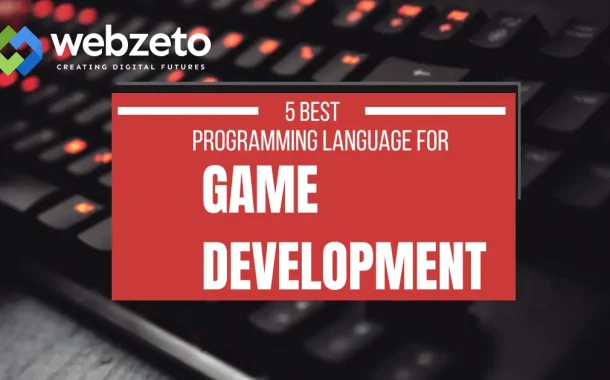Game development involves creating a game from start to finish. This includes designing characters, environments, and gameplay. Developers use various tools and engines to build games. They must also consider the target platform, such as PC, console, or mobile. The choice of programming language can impact the game’s performance on these platforms.
Table of Contents
Table of Contents
Factors in Choosing a Programming Language
When choosing a programming language for game development, several key factors come into play.
Performance
Performance is critical for games, especially those with complex graphics and real-time interactions. A language’s speed can affect frame rates and responsiveness. For instance, C++ is known for its efficiency and is often used in high-performance games. Languages that manage memory well can also help prevent lag and ensure smooth gameplay, which is vital for user experience.
Community Support
A strong community means access to a wealth of resources, tutorials, and forums for troubleshooting. Languages like C# and Python have large communities that contribute to libraries, frameworks, and tools. This support can make development easier and faster, as you can learn from others’ experiences and solutions. Active communities also foster collaboration and sharing of best practices.
Learning Curve
Some languages are easier to learn than others, which is important if you’re just starting out. Languages like Python are often recommended for beginners due to their readability and simplicity. A gentle learning curve allows new developers to grasp concepts quickly and become productive. Conversely, languages with steep learning curves may require more time to master, which could delay project timelines.
Platform Compatibility
Consider where you want your game to run. Some languages are better suited for specific platforms, such as mobile (e.g., Swift for iOS) or consoles (e.g., C++ for PlayStation). Additionally, cross-platform languages like JavaScript allow developers to create games that work on multiple devices. Ensuring that the chosen language supports your target platform can save time and reduce potential compatibility issues down the line.
Top Programming Languages for Game Development
1. C++
C++ is renowned for its performance and fine control over system resources, making it a top choice for high-end game development. Its features, like pointers and memory management, allow developers to optimize their code for speed and efficiency. This level of control is crucial for graphics-intensive games that demand real-time processing and low latency.
C++ powers many leading game engines, including Unreal Engine, which is favored for its stunning graphics capabilities. Developers often use C++ to build complex game mechanics and leverage extensive libraries, such as DirectX and OpenGL, to enhance visual fidelity and performance.
2. C#
C# is a modern, object-oriented language that combines the power of C++ with a simpler syntax. It is designed for ease of use, making it accessible for both beginners and experienced developers. Its strong type safety and rich class libraries facilitate faster development and fewer runtime errors, which is particularly valuable in game development.
Unity, one of the most widely used game engines globally, relies on C#. It offers a robust editor, a large asset store, and extensive documentation. Unity’s versatility allows developers to create 2D and 3D games for multiple platforms, including consoles, PCs, and mobile devices.
3. Java
Java’s portability is one of its strongest features, as it allows developers to write code once and run it anywhere with a Java Virtual Machine (JVM). This cross-platform capability is beneficial for games intended for various devices. Java also boasts strong security features and a comprehensive standard library, which aids in game development.
Frameworks like LibGDX provide a powerful platform for Java game development. These libraries simplify tasks like graphics rendering and input handling, enabling developers to focus on game design. Additionally, jMonkeyEngine is popular for 3D game development in Java, offering tools for rendering, physics, and more.
4. Python
Python is often praised for its simplicity and readability, making it an excellent choice for Python Web Development Company and beginners in game development. For those looking to learn Programming Languages, Python offers a gentle learning curve and a supportive community. Although Python may not match the performance of C++ or C#, it is effective for rapid prototyping and scripting.
Pygame is a popular library for creating 2D games in Python. It provides tools for graphics, sound, and user input, making it accessible for new developers. Whether you’re building games or web applications, a Python web development company can help leverage the language’s flexibility to deliver scalable, efficient solutions.
5. JavaScript
JavaScript is the backbone of web-based games, enabling developers to create interactive experiences directly in browsers. Its compatibility with HTML5 allows for rich graphics and multimedia features. JavaScript’s asynchronous capabilities also help manage real-time interactions smoothly.
Frameworks like Phaser are designed specifically for 2D game development in JavaScript, providing features like physics engines and input handling. For developers building browser-based multiplayer games, such as Minecraft-inspired titles, Minecraft hosting solutions can ensure low-latency performance and server stability. Three.js is widely used for creating 3D graphics in web browsers, allowing developers to build immersive environments without requiring extensive knowledge of WebGL.
Emerging Languages and Trends
1. Rust
Rust is gaining popularity in game development due to its emphasis on safety and performance. It prevents common programming errors, such as null pointer dereferences and data races, which can lead to crashes. Its memory management features eliminate the need for a garbage collector, resulting in faster execution.
Rust’s performance is comparable to C++, making it suitable for high-performance games. Its growing ecosystem includes libraries and frameworks that support game development, such as Amethyst and Bevy. Developers appreciate its modern syntax and strong community support, which encourages collaboration and innovation.
2. Go (Golang)
Go is known for its simplicity and efficiency, making it a good choice for game servers and backend services. It excels in concurrent programming, allowing developers to handle multiple tasks simultaneously, which is crucial for online multiplayer games.
Go’s lightweight nature and fast compilation times make it ideal for rapid development. Its growing popularity in cloud computing and microservices architecture has led to increased interest in using it for game development, particularly for server-side applications.
3. Swift
Swift is primarily known for iOS App development but is emerging in the game development space, particularly for mobile games. It offers a modern syntax and powerful features, making it easier for developers to write safe and efficient code.
Swift’s performance is impressive, and its strong typing system reduces runtime errors. With the support of frameworks like SpriteKit and SceneKit, developers can create visually appealing games for Apple devices while benefiting from the seamless integration with iOS features.
4. Kotlin
Kotlin is becoming a popular choice for Android game development due to its interoperability with Java. It simplifies coding by reducing boilerplate and offering modern programming features, enhancing developer productivity.
Kotlin’s null safety and concise syntax help prevent common errors, making game development smoother. As Android gaming continues to grow,
Kotlin’s adoption is likely to increase, especially for developers familiar with Java. Many businesses looking to build robust Android games often turn to a mobile app development company in USA to leverage Kotlin’s strengths for high-quality, efficient results.
5. Dart
Dart is primarily associated with Flutter for mobile app development but is making strides in game development as well. Its asynchronous programming model and strong performance are advantageous for creating responsive and interactive games.
Dart’s ability to compile to native code allows for high-performance applications across platforms. While still in the early stages of game development, libraries like Flame are emerging, enabling developers to create 2D games efficiently.
Conclusion
Choosing the right programming language for game development is essential for success. Each language has its strengths and weaknesses, impacting performance, ease of use, and platform compatibility. C++ and C# are popular for their performance and support from major game engines. Meanwhile, languages like Java and Python offer accessibility and versatility for different types of games.
Emerging languages like Rust and Go are gaining traction for their safety and efficiency, while Swift and Kotlin are making waves in mobile game development. As trends like cross-platform development and cloud gaming continue to grow, developers must stay updated on new tools and languages.














